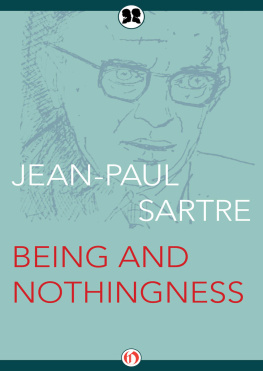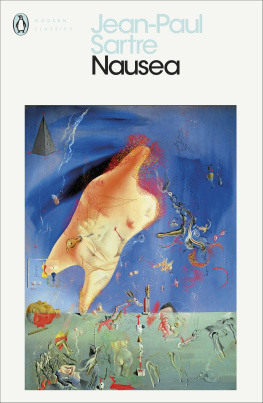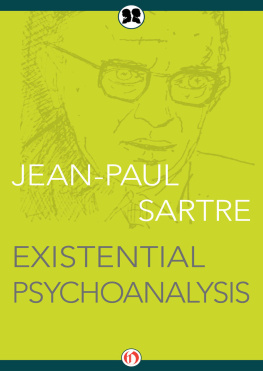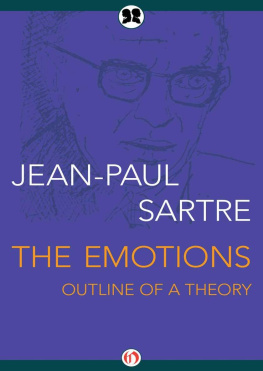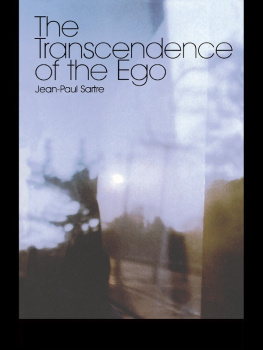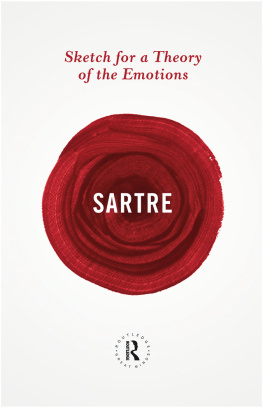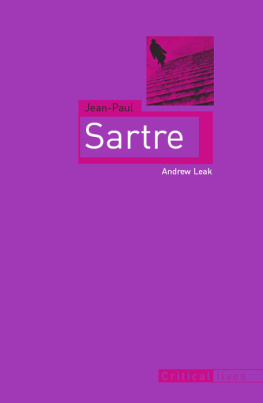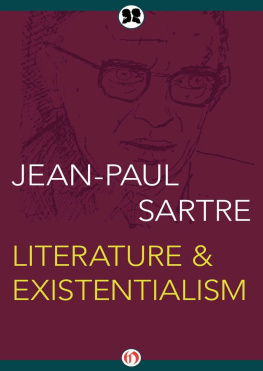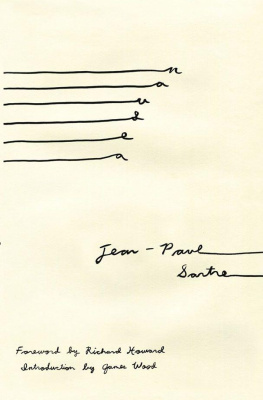Jean-Paul Sartre - Being and Nothingness: An Essay on Phenomenological Ontology
Here you can read online Jean-Paul Sartre - Being and Nothingness: An Essay on Phenomenological Ontology full text of the book (entire story) in english for free. Download pdf and epub, get meaning, cover and reviews about this ebook. year: 2011, publisher: Open Road, genre: Science. Description of the work, (preface) as well as reviews are available. Best literature library LitArk.com created for fans of good reading and offers a wide selection of genres:
Romance novel
Science fiction
Adventure
Detective
Science
History
Home and family
Prose
Art
Politics
Computer
Non-fiction
Religion
Business
Children
Humor
Choose a favorite category and find really read worthwhile books. Enjoy immersion in the world of imagination, feel the emotions of the characters or learn something new for yourself, make an fascinating discovery.
- Book:Being and Nothingness: An Essay on Phenomenological Ontology
- Author:
- Publisher:Open Road
- Genre:
- Year:2011
- Rating:4 / 5
- Favourites:Add to favourites
- Your mark:
- 80
- 1
- 2
- 3
- 4
- 5
Being and Nothingness: An Essay on Phenomenological Ontology: summary, description and annotation
We offer to read an annotation, description, summary or preface (depends on what the author of the book "Being and Nothingness: An Essay on Phenomenological Ontology" wrote himself). If you haven't found the necessary information about the book — write in the comments, we will try to find it.
Jean-Paul Sartre: author's other books
Who wrote Being and Nothingness: An Essay on Phenomenological Ontology? Find out the surname, the name of the author of the book and a list of all author's works by series.
Being and Nothingness: An Essay on Phenomenological Ontology — read online for free the complete book (whole text) full work
Below is the text of the book, divided by pages. System saving the place of the last page read, allows you to conveniently read the book "Being and Nothingness: An Essay on Phenomenological Ontology" online for free, without having to search again every time where you left off. Put a bookmark, and you can go to the page where you finished reading at any time.
Font size:
Interval:
Bookmark:

Being and Nothingness
An Essay on Phenomenological Ontology
Jean-Paul Sartre
Translated with an introduction by
Hazel E. Barnes
University of Colorado
Philosophical Library

Table of Contents
PART ONE
T HE P ROBLEM OF N OTHINGNESS
PART TWO
B EING-FOR- I TSELF
PART THREE
B EING-FOR- O THERS
PART FOUR
H AVING, D OING AND B EING
Translators Preface
This is a translation of all of Jean-Paul Sartres Ltre et le Nant. It includes those selections which in 1953 were published in a volume entitled Existential Psychoanalysis, but I have revised my earlier translation of these and made a number of small changes in technical terminology.
I should like to thank Mr. Forrest Williams, my colleague at the University of Colorado, who has helped me greatly in preparing this translation. Mr. Williams excellent understanding of both Sartres philosophy and the French language, and his generous willingness to give his time and effort have been invaluable to me.
I want also to express my appreciation to my friend, Mr. Robert O. Lehnert, who has read large sections of the book and offered many helpful suggestions and who has rendered the task more pleasant by means of stimulating discussions which we have enjoyed together.
Finally I am indebted to the University of Colorado, which through the Council on Research and Creative Work has provided funds for use in the preparation of the typescript.
In a work as long as this there are certain to be mistakes. Since I am the only one who has checked the translation in its entirety, I alone am responsible for whatever errors there may be. I hope that these may be few enough so that the work may be of benefit to those readers who prefer the ease of their own language to the accuracy of the original.
H AZEL E. B ARNES
University of Colorado
Translators Introduction
It has been interesting to watch existentialism run through what William James called the classic stages of a theorys career. Any new theory, said James, first is attacked as absurd; then it is admitted to be true, but obvious and insignificant; finally it is seen to be so important that its adversaries claim that they themselves discovered it.
Yet critics of Sartres works still tend to deal with them piecemeal, to limit themselves to worrying about the originality of each separate position, to weighing two isolated ideas against each other and testing them for consistency without relating them to the basic framework.the theory of the Ideas. What critics usually fail to see is that Sartre is one of the very few twentieth century philosophers to present us with a total system. One may at will accept or reject this system, but one is not justified in considering any of its parts in isolation from the whole. The new insights which Sartre offers us are sufficiently basic to put all of the familiar concepts in a wholly different light.
In a brief introduction I can not hope to deal with the mass of detailed evidence needed to show the full scope of Sartres thought, but I should like to do two things: first, I think it would be profitable to consider briefly earlier works of Sartres which serve as a kind of foundation for the fuller discussion in Being and Nothingness; second, I should like to discuss a few of the crucial problems presented in the latter work. In connection with the earlier writing, I shall be concerned only with those aspects which seem to me to be significantly connected with fundamental positions in Being and Nothingness; in the second part I am making no claim to presenting a full analysis or exposition of the book but merely offering some general comments as to a possible interpretation of certain central positions.
In an article called La Transcendance de lEgo. Esquisse dune description phnomnologique (1936) Sartre, while keeping within the general province of phenomenology, challenged Husserls concept of the transcendental Ego. The article does more than to suggest some of the principal ideas of Being and Nothingness. It analyzes in detail certain fundamental positions which though basic in the later work are there hurriedly sketched in or even presupposed. Most important is Sartres rejection of the primacy of the Cartesian cogito. He objects that in Descartes formulaI think; therefore I amthe consciousness which says, I am, is not actually the consciousness which thinks. (p. 92) Instead we are dealing with a secondary activity. Similarly, says Sartre, Descartes has confused spontaneous doubt, which is a consciousness, with methodical doubt, which is an act. (p. 104) When we catch a glimpse of an object, there may be a doubting consciousness of the object as uncertain. But Descartes cogito has posited this consciousness itself as an object; the Cartesian cogito is not one with the doubting consciousness but has reflected upon it. In other words this cogito is not Descartes doubting; it is Descartes reflecting upon the doubting. I doubt; therefore I am is really I am aware that I doubt; therefore I am. The Cartesian cogito is reflective, and its object is not itself but the original consciousness of doubting. The consciousness which doubted is now reflected on by the cogito but was never itself reflective; its only object is the object which it is conscious of as doubtful. These conclusions lead Sartre to establish the pre-reflective cogito as the primary consciousness, and in all of his later work he makes this his original point of departure.
Now it might seem at first thought that this position would involve an infinite regress. For if the Cartesian cogito reflects not on itself but on the pre-reflective consciousness, then in order for there to be self-consciousness, it might seem that we should need a cogito for the Cartesian cogito, another for this cogito and so on ad infinitum. But this would be the case only if self-consciousness required that the self be posited as an object, and Sartre denies that this is so. The very nature of consciousness is such, he says, that for it, to be and to know itself are one and the same. (p. 112) Consciousness of an object is consciousness of being consciousness of an object. Thus by nature all consciousness is self-consciousness, but by this Sartre does not mean that the self is necessarily posited as an object. When I am aware of a chair, I am non-reflectively conscious of my awareness. But when I deliberately think of my awareness, this is a totally new act of consciousness; and here only am I explicitly positing my awareness or myself as an object of reflection. The pre-reflective cogito is a non-positional self-consciousness. Sartre uses the words conscience non-positionelle (de) soi and puts the de in parentheses to show that there is no separation, no positing of the self as an object of consciousness. Similarly he speaks of it as a non-thetic self-consciousness. Thetic or positional self-consciousness is conscience de soi in which consciousness deliberately reflects upon its own acts and states and in so far as is possible posits itself as an object. The Cartesian cogito, of course, belongs to the second order.
In this same article Sartre lays down two fundamental principles concerning the pre-reflective consciousness which are basic in his later work. First, he follows Husserl in holding that all consciousness is consciousness of something; that is, consciousness is intentional and directive, pointing to a transcendent object other than itself. Here is the germ for Sartres later view of mans being-in-the-world, for his ontological proof of the existence of a Being-in-itself which is external to consciousness. Secondly, the pre-reflective cogito is non-personal. It is not true that we can start with some such statement as I am conscious of the chair. All that we can truthfully say at this beginning stage is that there is (
Font size:
Interval:
Bookmark:
Similar books «Being and Nothingness: An Essay on Phenomenological Ontology»
Look at similar books to Being and Nothingness: An Essay on Phenomenological Ontology. We have selected literature similar in name and meaning in the hope of providing readers with more options to find new, interesting, not yet read works.
Discussion, reviews of the book Being and Nothingness: An Essay on Phenomenological Ontology and just readers' own opinions. Leave your comments, write what you think about the work, its meaning or the main characters. Specify what exactly you liked and what you didn't like, and why you think so.

